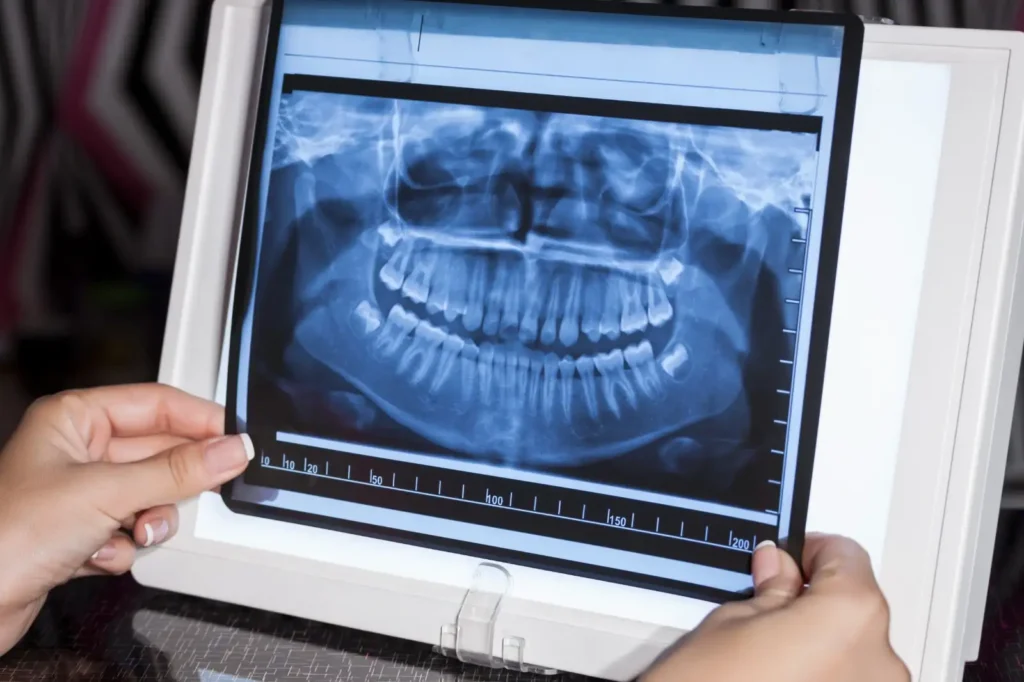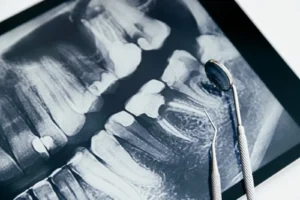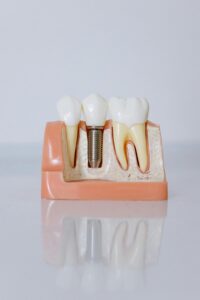Teeth sensitivity is a common dental issue characterized by discomfort or pain in teeth. It often occurs in response to certain stimuli, like hot or cold temperatures.
Sensitivity in teeth may start subtly, but for many, it can progress into a sharp, sudden discomfort that can affect one’s eating, drinking, and overall oral health routine. This dental condition arises when the tooth’s protective enamel wears down or when gum recession exposes the underlying surface, called dentin, which contains nerve endings.
Sensitive teeth can result from various factors such as aggressive brushing, acidic food, and drink, grinding teeth, or even dental procedures. Addressing tooth sensitivity early is key to managing symptoms effectively. Regular check-ups with a dentist and using desensitizing toothpaste may help minimize the discomfort. For anyone experiencing a jolt of pain while consuming hot coffee or ice cream, understanding and treating teeth sensitivity can greatly improve oral comfort and quality of life.
Causes of Teeth Sensitivity
Ever wonder why a sip of hot coffee or a bite of ice cream can send shivers down your spine? Teeth sensitivity can turn these simple joys into a painful ordeal. Let’s dive into the root causes of this common discomfort.
Erosion of Tooth Enamel
Your tooth enamel is the superhero shield that guards your teeth. Over time, this shield can wear down, exposing the sensitive core of your teeth to the villains of hot and cold foods.
- Acidic foods and beverages like lemons and sodas can speed up this wear.
- Brushing too hard may also contribute to eroding this protective layer.
- Dental procedures, like whitening, can temporarily make teeth more sensitive too.
Gum Recession
Healthy gums are essential for healthy teeth. When gums pull back, a portion of the tooth that’s normally covered is exposed. This portion, called the root, is highly sensitive.
- Gum disease is a prime culprit in gum recession.
- Aggressive tooth brushing can cause gums to recede.
- Genetics might play a role in your gum health.
Tooth Decay
Tooth decay is like a tiny burglar that creates holes in your teeth. These holes can get to the nerve, causing zaps of pain.
| Signs of Tooth Decay | Steps to Prevent Decay |
| Visible holes or pits in teeth | Regular brushing and flossing |
| Toothache or pain when biting | Use of fluoride toothpaste |
| Sensitivity to sweet, hot, or cold | Regular dental check-ups |
By knowing what leads to teeth sensitivity, you can take steps to protect your pearly whites. Consult your dentist for the best advice tailored to your oral health.
Common Triggers of Teeth Sensitivity
Imagine sipping a hot drink or enjoying an ice cream, only to be met with a sharp pain in your teeth. It’s not rare. Many adults experience teeth sensitivity. The discomfort can strike at any time. It often comes from things we eat or do. Let’s explore these triggers to better manage sensitive teeth.
Cold or Hot Foods And Beverages
Extreme temperatures can be tough on sensitive teeth. The sudden change from hot to cold can trigger a painful response. For example:
- Ice-cold smoothies
- Steamy coffee
Sensitive teeth feel these temperatures more than others. It is wise to take small sips or bites and let food reach a milder temperature.
Sweet or Acidic Foods
Sugar and acid both have a way of stirring up trouble in sensitive teeth. Sweets can attract bacteria that cause sensitivity. Acid wears away enamel, making teeth vulnerable. Some examples:
| Sweet Foods | Acidic Foods |
| Candies | Citrus fruits |
| Desserts | Tomatoes |
Limiting these foods can help reduce sensitivity. It’s all about balance and moderation.
Brushing or Flossing
Good oral hygiene is crucial. But, if you brush too hard, it might hurt. Soft-bristled brushes work best. Brushing gently is the key. Flossing should be careful too. Rough flossing can irritate gums and teeth. Always use a gentle touch.
Visit a dentist regularly. They can recommend products to lessen sensitivity. They can guide you on proper brushing and flossing techniques.
Tips for Managing Teeth Sensitivity
Do your teeth twinge when you enjoy hot soup or ice cream? Teeth sensitivity can dampen these joys. Thankfully, you can manage this discomfort. Here are some practical tips to keep your sensitive teeth in check.
Use Desensitizing Toothpaste
Desensitizing toothpaste can be a game-changer. It contains compounds that block sensation. Apply a small amount to a soft toothbrush or dot on sensitive spots before bed. Note results in a few weeks.
Use A Soft-bristled Toothbrush
- Select a toothbrush with soft bristles.
- Clean gently to protect the enamel.
- Replace it every three months or sooner if frayed.
Avoid Aggressive Brushing
Brushing hard can wear down the enamel, making sensitivity worse. Use gentle strokes. Imagine painting a delicate canvas — your teeth deserve the same care.
Avoid Teeth Grinding
Grinding puts pressure on teeth and can lead to sensitivity. Wear a mouthguard at night. It protects teeth and helps reduce grinding.
Preventive Measures for Teeth Sensitivity
To improve your daily comfort and enjoy a cold drink without flinching, taking steps to prevent teeth sensitivity is essential. This condition can affect anyone and often results in sudden, sharp pain. Let’s explore how to keep those pangs at bay with some smart, proactive habits.
Maintain Good Oral Hygiene
Proper brushing and flossing keep teeth healthy. Use a soft-bristled toothbrush and fluoride toothpaste to protect your enamel and gums. Brush gently, especially where the teeth and gums meet, to prevent wear that can lead to sensitivity. Don’t forget to replace your brush every 3-4 months.
- Brush twice a day for two minutes
- Floss daily to remove plaque and food particles
- Rinse with fluoride mouthwash regularly
Limit Consumption of Acidic Foods And Beverages
Sour candies, citrus fruits, and carbonated drinks can strip away enamel. Less enamel means sensitive teeth. To keep your enamel strong, it is wise to eat these foods in moderation.
| Limit These Foods | Enjoy These Instead |
| Lemons, Oranges | Bananas, Melons |
| Soda, Fruit Juice | Milk, Water |
| Vinegar-based Dressings | Olive Oil, Creamy Dressings |
Wear A Mouthguard for teeth-grinding
If you grind your teeth at night, you might be causing sensitivity. Wearing a mouthguard can protect them. Your dentist can make a custom-fitted guard for you. This reduces the pressure on your teeth and guards against wear.
- Custom mouthguards offer the best fit and protection
- Over-the-counter options are also available
- Wear it every night for the best results
When to Seek Professional Help for Teeth Sensitivity
A twinge of pain when enjoying a scoop of ice cream or a sip of hot coffee – might be familiar. Teeth sensitivity can occur from a variety of factors like thinning enamel or receding gums. It’s critical to recognize when it’s just an inconvenience and when it’s a sign of something more serious. There are certain times when visiting a dentist is imperative to maintain oral health and prevent further discomfort.
Persistent Sensitivity
If you constantly feel discomfort or a sharp tingle from hot, cold, sweet, or acidic food and drinks, don’t ignore these signals. A threshold exists between normal and excessive sensitivity. Sensitivity that lingers for days needs professional evaluation to determine the underlying cause and treatment.
Severe Pain Or Discomfort
Teeth sensitivity that escalates to severe, throbbing pain suggests a more serious issue. Don’t endure excruciating discomfort. Immediate dentist intervention can provide relief and safeguard your teeth from further damage.
Sensitivity Accompanied by Other Oral Issues
Occasional sensitivity may not be alarming, but paired with other symptoms, it’s a red flag. Look out for signs such as bleeding gums, loose teeth, or persistent bad breath. These symptoms combined with sensitivity could indicate gum disease or decay and warrant a prompt dental visit.
The health of your teeth must never take a backseat. Early detection is key in treating dental sensitivities effectively. Regular check-ups and proper oral hygiene can alleviate sensitivity and ensure a healthy, pain-free smile.
Frequently Asked Questions about Teeth Sensitivity
Why Are My Teeth Sensitive All Of A Sudden?
Sudden tooth sensitivity often stems from enamel wear, gum recession, or a cracked tooth. It can also indicate dental issues like cavities or a developing abscess. Consulting a dentist is recommended for a precise diagnosis and treatment.
Can Tooth Sensitivity Go Away?
Yes, tooth sensitivity can sometimes resolve on its own, especially if it’s caused by temporary factors like mild dental work or teeth whitening.
What To Do When All My Teeth Hurt?
Consult a dentist immediately if all your teeth hurt. Meanwhile, use over-the-counter pain relievers and maintain oral hygiene. Avoid extreme temperatures in foods and drinks to reduce tooth sensitivity and discomfort.
What Can You Do For Unbearable Tooth Pain?
For unbearable tooth pain, immediately rinse your mouth with warm saltwater and take over-the-counter pain relievers. Apply a cold compress outside the affected area. Avoid hot or cold foods and drinks. See your dentist as soon as possible.
Conclusion
Dealing with sensitive teeth requires a proactive approach. Regular dental checks and tailored hygiene practices are your allies against discomfort. Embrace the right products and methods to soothe your symptoms. Remember, a pain-free smile is within reach with consistent care and attention to your dental health.





